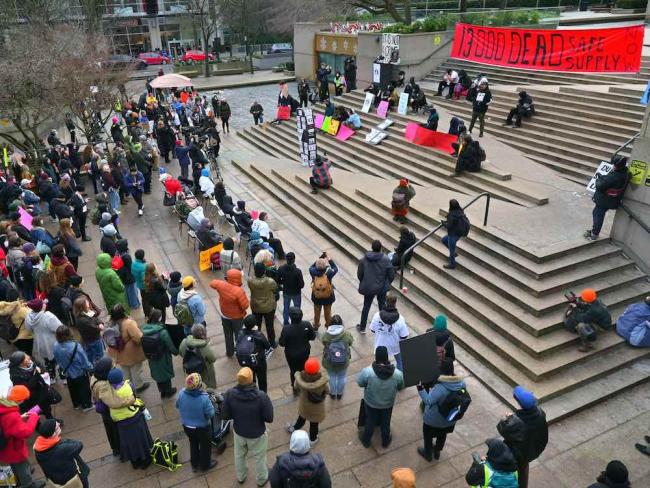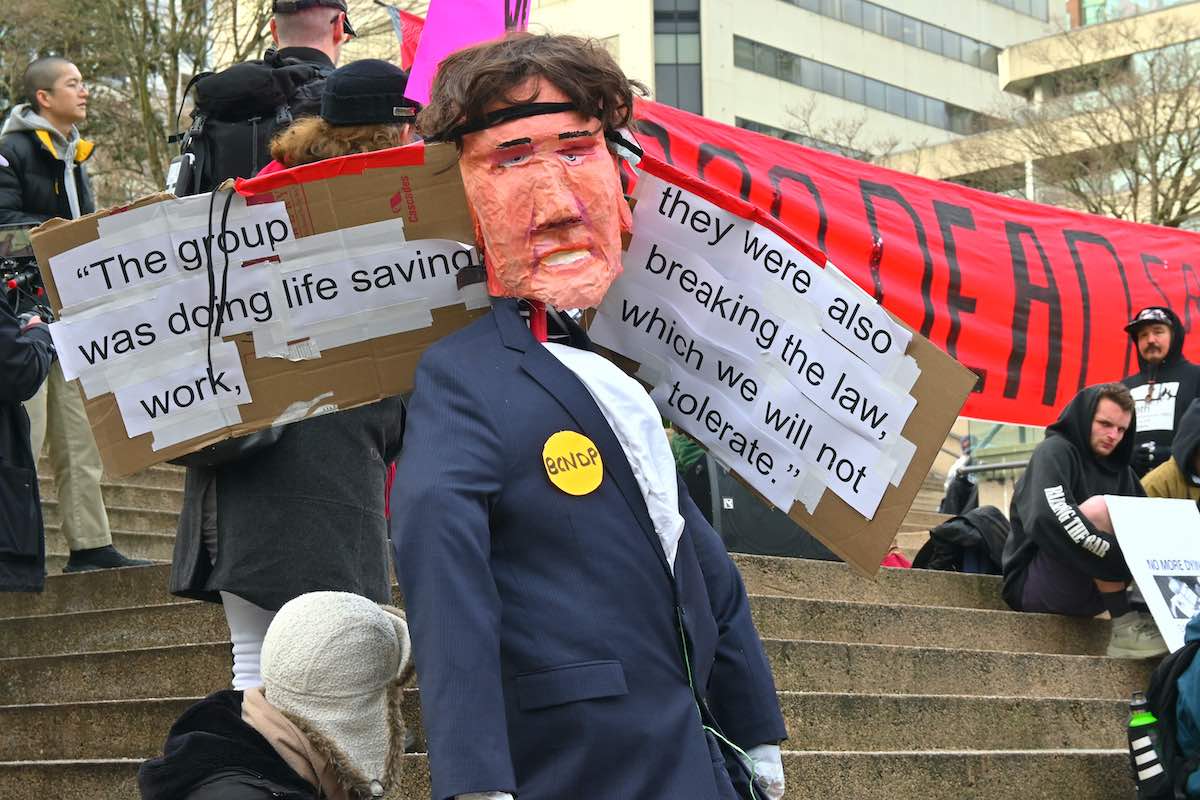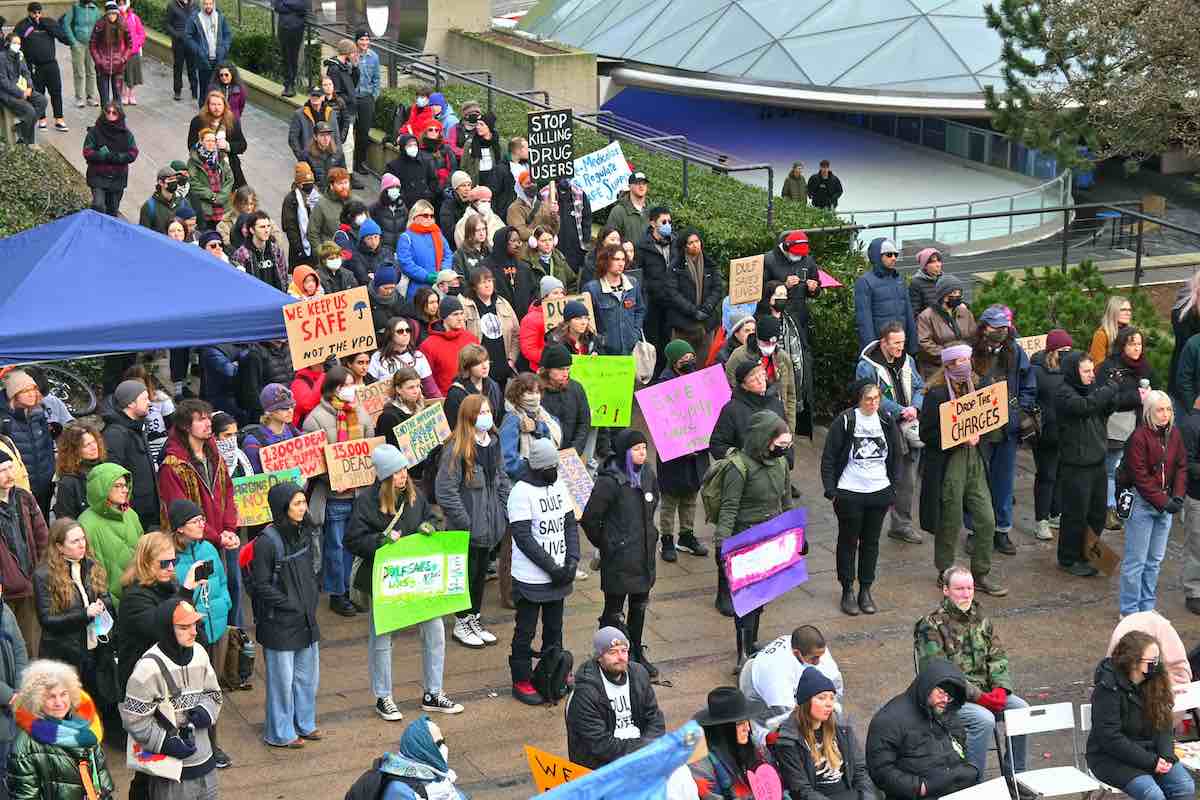Articles Menu

Jan. 17, 2024
Around 400 people gathered at the Vancouver courthouse Tuesday to support Eris Nyx and Jeremy Kalicum, co-founders of the Drug User Liberation Front. The pair were scheduled to make their first court appearance after their October arrests.
But they didn’t end up getting their day in court. Instead, the matters were struck from the court list to give the Crown more time to review whether there is a substantial likelihood of conviction and whether the public interest requires a prosecution, said Stephanie Dickson, a lawyer with Pender Litigation and counsel, along with Tim Dickson, for Nyx and Kalicum.
Nyx and Kalicum were arrested by police for suspected trafficking of controlled substances and for possession with the intent to traffic controlled substances. They have not yet been charged.
If charges are approved, Dickson said, they plan to challenge the constitutionality of the prohibitions in the Controlled Drugs and Substances Act. It’s also possible that the pair won’t be charged because DULF was working to save lives, she added.
Dickson said a new court date will likely be set in the coming weeks.
The pair had been buying unregulated cocaine, meth and heroin off the internet, rigorously testing the substances and selling them at cost to compassion club members in clearly marked bags that listed the substance alongside any cuts and buffing agents.
The idea was to give the club’s 42 compassion club members access to a clean, regular supply of drugs in order to protect them from the toxicity of B.C.’s current unregulated street drug supply.
After one year of operation, DULF reported that its compassion club members had experienced fewer overdoses, fewer negative interactions with police, fewer hospitalizations and less drug-related violence. No members had died of overdose.

DULF had also been funded by Vancouver Coastal Health to run an overdose prevention site where club members could access overdose prevention and drug checking. This funding was ended Oct. 31 last year. Both Vancouver Coastal Health and DULF previously told The Tyee that the funds from VCH had not been used to buy drugs. DULF said it used donations to buy drugs.
In British Columbia the toxic drug crisis is the leading cause of death for people aged 10 to 59 and, according to the BC Coroners Service, has killed around seven people per day in the province over the last year. Since a public health emergency was declared in April 2016, more than 13,000 people have died after using unregulated drugs.
The current drug supply is highly potent and has several substances in it, which can increase a person’s risk of overdose when they are unable to know what they are taking or how strong the substance is.
At the Vancouver rally people called for Canada to end its war on drugs and to legalize and regulate all substances so people who use drugs can access a regulated supply.
Drug advocates are not the only ones calling for existing drug policy to change.
Shortly after Nyx and Kalicum were arrested, the BC Coroners Service published its third Death Review Panel, which called for the province to introduce a non-medical model for safer supply that would give people who use drugs access to alternatives to the unregulated drug market.
Many people interpreted this to mean testing and distribution through compassion clubs, like the one DULF was running.
On the same day the Death Review Panel was published, Minister of Mental Health and Addictions Jennifer Whiteside responded with a letter saying the province would not consider a non-medical model for safer supply.
The Tyee asked the Ministry of Mental Health and Addictions to respond to these calls for legalization and regulation of substances to save lives.
In an emailed statement, a spokesperson for the ministry said the legalization of drugs such as those DULF sold fell under the jurisdiction of the federal government.
The provincial government, the statement continued, “is working urgently to build an integrated and comprehensive system of mental health and addictions care from the ground up, to ensure people can access effective care when and where they need it and to separate people from the toxic drug supply. This means expanding access to care including prevention, harm reduction, treatment and recovery services, carefully based on evidence and best practice.”
Rallies around the world
There were five different rallies held around the world on Tuesday in support of Nyx and Kalicum, with people gathering in Vancouver, Nelson, Calgary, Dublin and London.
In London around 20 people gathered around the Canadian Embassy and chanted “Safe supply saves lives,” and “VPD, shame on you.”
“We often look to our North American comrades, including DULF, for inspiration and direction in the global harm reduction movement,” London co-organizers Shayla S. Schlossenberg, drug service co-ordinator at Release, and André Belchior Gomes, communications lead at Release, told The Tyee in an emailed statement. Release is an independent charity that helps educate the public and professionals about drug use and drug laws in the United Kingdom.
Schlossenberg and Belchior Gomes added that 4,907 people died of drug-related causes in England and Wales in 2023, the worst year for fatalities in those countries to date. England and Wales have a combined population of 59.6 million, according to a 2021 census.
Canada, by comparison, has a population of 40.8 million and had 3,970 deaths in just the first six months of 2023, according to a December 2023 update from the Public Health Agency of Canada. Most of those deaths happened in B.C., Alberta and Ontario.
In Dublin, six people gathered in support of DULF, Lynn Jefferys, operations manager for the European Network of People Who Use Drugs, told The Tyee in an email.
The Dublin rally was organized to “highlight the global importance of [DULF’s] direct action in the face of state silence,” Jefferys wrote. Ireland has had clusters of overdoses over the last year, linked to nitazenes, a synthetic opioid.
“In Ireland we stand on the cusp of a toxic drug supply crisis,” Jefferys added, noting that naloxone, which can reverse an overdose and is available for free at all pharmacies in B.C., is available only through prescription in Ireland. Ireland does not report annual overdose deaths, Jefferys added.

“The DULF case and the legal precedent it may result in is very much in the interest of people who use drugs and activists in Europe whose main goal, like DULF, is to save lives,” Jefferys said. “We stand in solidarity with Jeremy and Eris.”
Tuesday’s rallies were designed to raise awareness that the charges against DULF are “ridiculous” and that “they were engaged in an activity that was saving lives and acting in a way that the government should act to get people access to a regulated supply,” Leslie McBain told The Tyee. McBain is co-founder of Moms Stop the Harm, a network of Canadian families whose loved ones have died from drug-related harms or struggle with substance use.
“Every day and even as we speak, someone is dying in this province from the toxic supply,” said McBain, who lost her son, Jason, 10 years ago.
“If my son was alive and still in a desperate situation but had access to a compassion club like DULF, then he could have stabilized,” she added. “That’s what people were able to do with DULF, they could stabilize and think about recovery.”
DULF has been caught in the middle of a “moral panic,” said Vince Tao, a community organizer with the Vancouver Area Network of Drug Users.
Tao said he hopes that the charges against DULF will be thrown out and that the support for DULF will grow into a global movement for safer supply.
Michelle Gamage is The Tyee’s health reporter. This reporting beat is made possible by the Local Journalism Initiative.
[Top photo: Rallies were held around the world on Tuesday in support of Eris Nyx and Jeremy Kalicum, with people gathering in Vancouver, Nelson, Calgary, Dublin and London. Photo for The Tyee by Michelle Gamage.]